Abstract
This paper identifies a number of key questions concerning children's understanding of probability. A selection of psychological and pedagogical research studies is evaluated. Attention is drawn to the various definitions of probability assumed by their authors, indicating the relevance of these to an understanding and synthesis of the reported findings. The possibility of basing relevant classroom practice on subjective rather than theoretical concepts of probability is discussed.
Similar content being viewed by others
References
Assessment of Performance Unit (APU): 1981, 1982, 1983, Mathematical Development, Primary and Secondary Survey Reports, 1, 2 and 3, HMSO.
BellC. R.: 1979, ‘Psychological aspects of probability and uncertainty’, Chapter 1 in Uncertain Outcomes, C. R.Bell (ed.), MTP Press Ltd, Lancaster, England, pp. 5–21.
BentzH. J.: 1983, ‘Stochastics teaching based on common sense’, Proceedings of the First International Conference on Teaching Statistics, Volume 2, pp. 753–766.
CEMREL: 1981, Comprehensive School Mathematics Program, (CSMP), Cemrel, Inc., St. Louis.
CohenJ. and HanselC. E. M.: 1955, ‘The idea of independence’, British Journal of Psychology 46, 178–190.
DeFinettiB.: 1974, Theory of Probability: a Critical Introductory Treatment, Wiley, England.
Dinges, H.: 1980, Thesenpapier, Manuscript, Frankfurt.
EdwardsW., LindmanH., and SavageL. J.: 1963, ‘Bayesian statistical analysis for psychological research’, Psychological Review 70, 193–242.
EfronB.: 1978, ‘Controversies in the foundation of statistics’, American Mathematics Monthly 85, 231–246.
EngleA., VargaT., and WalserW.: 1976, Hasard ou stratégie, O.C.D.L., Paris, (1972, Ernst Klett Verlag, German version).
EstesW. K.: 1950, ‘Toward a statistical theory of learning’, Psychological Review 57, 94–107.
EstesW. K.: 1964, ‘Probability learning’, in A. W.Melton (ed.), Categories of Human Learning, Academic Press, New York, pp. 89–128.
FalkRuma: 1983, ‘Choice behaviour in probabilistic situations’, Proceedings of the First International Conference on Teaching Statistics, Volume 2, pp. 714–727.
FischbeinE.: 1975, The Intuitive Sources of Probabilistic Thinking in Children, D. Reidel, Dordrecht.
FischbeinE. and GazitA.: 1983, ‘Does the teaching of probability improve probabilistic intuitions?’, Proceedings of the First International Conference on Teaching Statistics, Volume 2, pp. 738–753.
FischbeinE. and GazitA.: 1984, ‘Does the teaching of probability improve probabilistic intuitions?, Educational Studies in Mathematics 15, 1–24.
FischbeinE., PampuI., and MinzatI.: 1970, ‘Comparison of ratios and the chance concept in children’, Child Development 41, 377–389. Also reprinted in Fischbein (1975) above.
FreudenthalH.: 1973, ‘Probability and statistics’, in Mathematics as an Educational Task, D. Reidel, Dordrecht, Chapter 18 and Appendix I.
FreudenthalH.: 1975, ‘Pupils' achievements internationally compared — the IEA’ Educational Studies in Mathematics 6, 127–186.
Fuller, M.: 1980, ‘Problems of learning statistics’, (unpub.) paper given at conference on ‘Teaching Statistics using Practicals’, Sheffield University, England.
GreenD. R.: 1982, Probability Concepts in School Pupils Aged 11–16 Years, Addison-Wesley, Massachusetts.
HartK.: 1981, Children's Understanding of Mathematics, Addison-Wesley, London.
HillW. F.: 1963, Learning, Methuen, London.
KahnemanD., SlovicP., and TverskyA. (ed.): 1982, Judgment under Uncertainty: Heuristics and Biases, Cambridge University Press, England.
LindleyD. V., TverskyA., and BrownR. V.: 1979, ‘On the reconciliation of probability assessments‘, Journal of the Royal Statistical Society, Series A 142, 146–180.
LindsayP. H. and NormanD. A.: 1972, Human Information Processing, Academic Press, London.
MostellerF.: 1965, Fifty Challenging Problems in Probability with Solutions, Addison-Wesley, Massachusetts.
MyersJ. L.: 1983, ‘The role of explanation in teaching elementary probability’, Proceedings of the First International Conference on Teaching Statistics, Volume 2, pp. 802–813.
National Council for Teachers of Mathematics, (NCTM): 1981, Teaching Statistics and Probability, Yearbook, NCTM, A. Shulte (ed.).
OjemannR. H., MaxeyE. J., and SniderB. C.: 1965, ‘Effects of guided learning experiences in developing probability concepts at the fifth grade level’, Perceptual & Motor Skills 21, 415–427.
OjemannR. H., MaxeyE. J., and SniderB. C.: 1965, ‘The effect of a program of guided learning experiences in developing probability concepts at the third grade level’, Journal of Experimental Education 33, 321–330.
OjemannR. H., MaxeyE. J., and SniderB. C.: 1966, ‘Further study of guided learning experience in developing probability concepts in grade five’, Perceptual & Motor Skills 23, 323–336.
Piaget, J.: 1941, The Child's Conception of Number, translated 1952, Routledge, London.
PiagetJ. and InhelderB.: 1951, The Origin of the Idea of Chance in Children, translated 1975, Routledge & Kegan Paul, London.
Schools Council Project on Statistical Education (POSE): 1980, Statistics in your world, Foulsham Educational, England.
ShaughnessyJ. M.: 1983, ‘Misconceptions of probability, systematic and otherwise; teaching probability and statistics so as to overcome some misconceptions’, Proceedings of the First International Conference on Teaching Statistics, Volume 2, pp. 784–802.
SiegelS. and AndrewsJ.: 1962, ‘Magnitudes of reinforcement and choice behaviour in children’, Journal of Experimental Psychology 63, 337–341.
SkempR. R.: 1971, The Psychology of Learning Mathematics, Penguin, England.
SteinbergH. and VonHartenG.: 1983, ‘Learning from experience — Bayes' theorem: a model for stochastic learning’, Proceedings of the First International Conference on Teaching Statistics, Volume 2, pp. 701–714.
TverskyA. and KahnemanD.: 1980, ‘Causal schemas in judgments under uncertainty’ in Progress in Social Psychology, M.Fishbein (ed.), Erlbaum, Hillsdale, N.J., pp. 6, 10, 19, 30.
Well, A. D., Pollatsek, A., and Ronald, C.: 1982, ‘Probability estimation and the use and neglect of base-rate information’, paper presented at the research presession, National Council of Teachers of Mathematics meetings, Toronto. Under revision at the University of Massachusetts, Amherst.
WoodworthR. S. and SchlosbergH.: 1954, Experimental Psychology, Third Edition, Methuen, London.
WrightG.: 1982, ‘Changes in the realism and distribution of probability assessments as a function of question type’, Acta Psychologica 52, 165–174.
Author information
Authors and Affiliations
Rights and permissions
About this article
Cite this article
Hawkins, A.S., Kapadia, R. Children's conceptions of probability — A psychological and pedagogical review. Educ Stud Math 15, 349–377 (1984). https://doi.org/10.1007/BF00311112
Issue Date:
DOI: https://doi.org/10.1007/BF00311112



